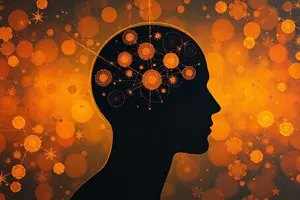Podcast
Questions and Answers
Which brain regions are associated with theory of mind tasks according to neuroimaging?
Which brain regions are associated with theory of mind tasks according to neuroimaging?
- Hippocampus, thalamus, hypothalamus, and basal ganglia
- Frontal lobe, occipital lobe, temporal lobe, and parietal lobe
- Medial prefrontal cortex, posterior superior temporal sulcus, precuneus, and amygdala (correct)
- Cerebellum, brainstem, corpus callosum, and ventricles
What does theory of mind refer to in psychology?
What does theory of mind refer to in psychology?
- Understanding the principles of cognitive development
- Understanding the functions of the prefrontal cortex
- Understanding one's own thoughts and emotions
- Understanding other people by attributing mental states to them (correct)
What is the relationship between theory of mind and empathy?
What is the relationship between theory of mind and empathy?
- Theory of mind includes empathy
- Completely unrelated
- Empathy includes theory of mind
- Similar but not identical (correct)
What can affect a person's capacity to display theory of mind?
What can affect a person's capacity to display theory of mind?
What is crucial for success in everyday human social interactions?
What is crucial for success in everyday human social interactions?
Flashcards
Theory of mind
Theory of mind
Understanding other people by attributing mental states to them, basically, figuring out what someone else is thinking.
Brain regions linked to theory of mind
Brain regions linked to theory of mind
Brain regions associated with theory of mind, like the prefrontal cortex and posterior superior temporal sulcus.
Empathy
Empathy
The ability to understand and relate to other people's emotions, like feeling their joy or sadness.
Factors affecting theory of mind
Factors affecting theory of mind
Signup and view all the flashcards
Importance of theory of mind
Importance of theory of mind
Signup and view all the flashcards
Study Notes
Theory of Mind in Psychology
- Theory of mind refers to the ability to attribute mental states, such as beliefs, desires, and intentions, to oneself and others, and to understand that others can have different mental states than one's own.
Brain Regions Associated with Theory of Mind
- The medial prefrontal cortex (mPFC) is a key region involved in theory of mind tasks, as revealed by neuroimaging studies.
- The superior temporal sulcus (STS) and the temporoparietal junction (TPJ) are also activated during theory of mind tasks.
Theory of Mind and Empathy
- Theory of mind is closely linked to empathy, as it allows individuals to understand and share the feelings of others.
- Empathy is thought to be a necessary component of theory of mind, as it enables individuals to understand others' emotional states.
Factors Affecting Theory of Mind
- Cognitive load can impair a person's capacity to display theory of mind, as it reduces the ability to reason about others' mental states.
- Autism spectrum disorder is characterized by impairments in theory of mind, leading to difficulties in social interactions.
- Brain damage or disorders, such as schizophrenia, can also affect a person's capacity to display theory of mind.
Importance of Theory of Mind in Social Interactions
- Theory of mind is crucial for success in everyday human social interactions, as it allows individuals to understand others' intentions, beliefs, and desires.
- It enables individuals to engage in effective communication, cooperation, and conflict resolution.
Studying That Suits You
Use AI to generate personalized quizzes and flashcards to suit your learning preferences.




